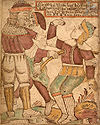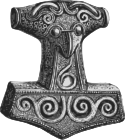- Skald
-
For other uses, see Skald (disambiguation).
 Bersi Skáldtorfuson composing poetry while in chains after being captured by King Óláfr Haraldsson.
Bersi Skáldtorfuson composing poetry while in chains after being captured by King Óláfr Haraldsson.
The skald was a member of a group of poets, whose courtly poetry (Icelandic: dróttkvæði) is associated with the courts of Scandinavian and Icelandic leaders during the Viking Age, who composed and performed renditions of aspects of what we now characterise as Old Norse poetry (the complementary aspect being the anonymous Eddaic poetry).
The most prevalent metre of skaldic poetry is dróttkvætt. The subject is usually historical and eulogic, detailing the deeds of the skald's king.
The technical demands of the skaldic form were equal to the complicated verse forms mastered by the Welsh bards and Irish ollaves, and like those poets, much of the skaldic verse consisted of panegyrics to kings and aristocrats, or memorials and testimonials to their battles. The kings and nobles, for their part, were not only intelligent and appreciative audiences for gifted skalds; some of them were poets in their own right.
Contents
Etymology
The West Germanic counterpart of the skald is the scop. Not unlike the scop, which is related to Modern English scoff, the name skald is continued in English scold, reflecting the central position of mocking taunts in Germanic poetry. The word is perhaps ultimately related to Proto-Germanic *skalliz "sound, voice, shout" (OHG skal "sound"). OHG has skalsang "song of praise, psalm". skellan means "ring, clang, resound". The OHG variant stem skeltan etymologically identical to the skald- stem (Proto-Germanic *skeldan) means "to scold, blame, accuse, insult". The person doing the insulting is a skelto or skeltāri. This bears striking similarities to the Dutch verb "schelden" which means "shouting abuse" or "calling names."
History
Skaldic poetry can be traced to the earlier 9th century with Bragi Boddason and his Ragnarsdrápa, the oldest surviving Norse poem besides the poem preserved epigraphically on the Eggjum stone. Þorbjörn Hornklofi's Glymdrápa of the late 9th century is the oldest surviving poem in the dróttkvætt metre, and the Karlevi Runestone from the late 10th century has the oldest surviving text in the metre. From the 10th century, the poems begin to syncretize pagan and Christian elements. In the 11th century, the professional skald is extinct in continental Scandinavia with the progressing Christianisation of Scandinavia, but survives in Iceland into the 13th century. As the profession was threatened with extinction in Iceland as well, Snorri Sturluson compiled the Prose Edda as a manual with the aim to preserve an appreciative understanding of their art. Snorri's Heimskringla also preserves many poems.
Skaldic poetry
Most Nordic verse of the Viking Age came in one of two forms: eddic or skaldic. Eddic verse was usually simple, in terms of content, style and metre, dealing largely with mythological or heroic content. Skaldic verse, conversely, was complex, and usually composed as a tribute or homage to a particular Jarl or king. Performance of skaldic poetry was spoken, not sung or chanted.
Unlike many other literary forms of the time, much skaldic poetry is attributable to an author (called a skald), and these attributions may be relied on with a reasonable degree of confidence. Many skalds were men of influence and power, and were thus biographically noted. The meter is ornate, usually dróttkvætt or a variation thereof. The syntax is complex, with sentences commonly interwoven, with kennings and heiti being used frequently and gratuitously.
Skaldic poetry was written in variants and dialects of Old Norse languages. Technically, their verse was usually a form of alliterative verse, and almost always using the dróttkvætt stanza (also known as the Court or Lordly Metre). Dróttkvætt is effectively an eight line form, where each pair of lines is an original single long line which is conventionally written as two lines.
Forms of skaldic poetry
Forms of skaldic poetry are:
- Drápa, a long series of stanzas (usually dróttkvætt), with a refrain (stef) at intervals.
- Flokkr, vísur or dræplingr, a shorter series of such stanzas without refrain.
- Lausavísa, a single stanza of dróttkvætt said to have been improvised impromptu for the occasion it marks.
Skalds also composed insult (níðvísur) and very occasionally, erotic verse (mansöngr).
Kennings
The verses of the skalds contain a great profusion of kennings, the fixed metaphors found in most northern European poetry of the time. Kennings are devices ready to supply a standard image to form an alliterating half-line to fit the requirements of dróttkvætt; but the substantially greater technical demands of skaldic verse required that these devices be multiplied and compounded in order to meet its demands for skill and wordplay. These images can therefore become somewhat hermetic, at least to those who fail to grasp the allusions that lie at the root of many of them.
Skaldic poems
Most of the skaldic poetry we have are poems composed to individual kings by their court poets. They typically have historical content, relating battles and other deeds from the king's career.
- Glymdrápa - The deeds of Harald Fairhair
- Vellekla - The deeds of Hákon Hlaðajarl.
- Bandadrápa - The deeds of Eiríkr Hlaðajarl.
- Knútsdrápa - The deeds of Cnut (I) the Great
A few surviving skaldic poems have mythological content.
- Þórsdrápa - A drápa to the god Thor telling the tale of one of his giant-bashing expeditions.
- Haustlöng - Relates two tales from the mythology as painted on a shield given to the poet.
- Ragnarsdrápa - Relates four tales from the mythology as painted on a shield given to the poet.
- Húsdrápa - Describes mythological scenes as carved on kitchen panels.
- Ynglingatal - describes the origin of the Norwegian kings and the history of the House of Yngling. It is preserved in the Heimskringla.
To this could be added two poems relating the death of a king and his reception in Valhalla.
- Hákonarmál - The death of king Hákon the Good and his reception in Valhalla.
- Eiríksmál - The death of king Eiríkr and his reception in Valhalla.
Some other were composed as circumstance pieces, such as those by Egill Skallagrímsson
- Sonatorrek - A lament on the death of Egill's sons
- Höfuðlausn - a praise for King Eiríkr Bloodaxe, that saved its author's head
- Arinbjarnarkviða - In praise of the poet's friend Arinbjörn
Notable skalds
More than 300 skalds are known from the period between AD 800 and 1200. Many are listed in the Skáldatal, not all of whom are known from extant material. Notable names include:
- Bragi Boddason "the Old" (early 9th century), author of Ragnarsdrápa
- Þorbjörn hornklofi (9th century)
- Þjóðólfr of Hvinir (fl. c. 900), author of Haustlöng and Ynglingatal
- Eyvindr Finnsson (10th century), known also as Eyvindr skáldaspillir, or Eyvindr the Plagiarist, the author of Hákonarmál and Háleygjatal
- Egill Skallagrímsson (10th century), author of Sonatorrek, Höfuðlausn and Arinbjarnarkviða
- Kormákr Ögmundarson (mid-10th century), the main character of Kormáks saga
- Eilífr Goðrúnarson (late 10th century), author of Þórsdrápa
- Þórvaldr Hjaltason (later 10th century), a skald of king Eric the Victorious
- Hallfreðr Óttarsson (late 10th century, court poet of King Óláfr Tryggvason
- Einarr Helgason "Skálaglamm" (late 10th century), "of the gleaming coins" - author of Vellekla
- Úlfr Uggason (late 10th century), author of the Húsdrápa
- Tindr Hallkelsson (fl. c. 1000), one of Hákon Sigurðarson's court poets
- Gunnlaugr Illugason (10/11th century), nicknamed Ormstunga "Worm-tongue" on account of his propensity for satire and invective
- Sigvatr Þórðarson (earlier 11th century)
- Þórarinn loftunga (earlier 11th century)
- Óttarr svarti (earlier 11th century), a skald at the court of king Olof Skötkonung and Olaf the Stout
- King Haraldr Harðráði (mid-11th century)
- Arnórr Þórðarson (mid-11th century), Jarlaskald "the Earls' Skald"
- Einarr Skúlason (12th century)), author of Geisli
- Snorri Sturluson (12/13th century)
- Þórir Jökull Steinfinnsson (13th century)
See also
- Old Norse poetry
- Alliterative verse
- Scop
- The griots perform similar functions in West African societies.
External links
- Dróttkvæði, skjaldkvæði og rímur from heimskringla.no.
- Finnur Jónsson, ed. Den norsk-islandske skjaldedigtning, from heimskringla.no.
- Finnur Jónsson, ed. Den norsk-islandske skjaldedigtning. 4 vols. Copenhagen: Villadsen og Christensen, 1912-15. Photographic reprint Copenhagen: Rosenkilde og Bagger, 1967. Still the definitive edition.
- Skaldic Project homepage: Skaldic poetry currently under edition (Clunies Ross et al.).
- Index of Old Norse/Icelandic Skaldic Poetry at the Jörmungrund database
- Sveinbjörn Egilsson and Finnur Jónsson, eds. Lexicon poeticum antiquæ linguæ septentriolanis: ordbog over det norsk-islandske skjaldesprog. 2nd ed. Copenhagen: Det kongelige nordiske oldskriftselskab, 1913-16 Also in partial form at the Jörmungrund database
 Icelandic language
Icelandic languageFeatures 
Names History and literature Promotion and purism Árni Magnússon Institute for Icelandic Studies · Icelandic Language Day · Icelandic Language Council · Icelandic Language Fund · Icelandic Language Institute · Icelandic Naming Committee · Linguistic purism (High Icelandic)Related topics Norse paganism Deities,
heroes,
and figuresOthersAsk and Embla · Dís (Norns · Valkyries) · Dwarf · Einherjar · Elves (Light elves · Dark elves) · Fenrir · Hel · Jörmungandr · Jötunn · Sigurd · Völundr · Vættir
Locations Asgard · Bifröst · Fólkvangr · Ginnungagap · Hel · Jötunheimr · Midgard · Múspellsheimr · Niflheim · Valhalla · Vígríðr · Wells (Mímisbrunnr · Hvergelmir · Urðarbrunnr) · YggdrasilEvents Sources Society See also Categories:- Skaldic poetry
- Icelandic literature
- Old Norse literature
- Medieval literature
- Nordic folklore
- Norse mythology
- Viking Age
- Viking Age poets
Wikimedia Foundation. 2010.
